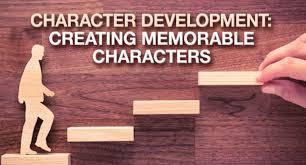Building a Strong Foundation: The Importance of Character Development

Character development is the process of creating and refining an individual's personality, values, and behavior. It is a lifelong journey that involves learning, growing, and adapting to various situations and experiences. Character development is essential for achieving success and happiness in life, as it helps individuals build strong relationships, make informed decisions, and overcome challenges.
Why is Character Development Important?
Character development is important for several reasons:
1. Builds Strong Relationships: Character development helps individuals build strong, meaningful relationships with others. By developing empathy, communication skills, and conflict resolution strategies, individuals can navigate complex social situations and build lasting connections.
2. Improves Decision-Making: Character development helps individuals make informed, thoughtful decisions. By developing critical thinking skills, considering multiple perspectives, and evaluating evidence, individuals can make decisions that align with their values and goals.
3. Enhances Resilience: Character development helps individuals develop resilience, which is critical for overcoming challenges and setbacks. By developing coping strategies, learning from failures, and maintaining a positive attitude, individuals can bounce back from adversity and achieve their goals.
4. Supports Personal Growth: Character development supports personal growth and self-improvement. By developing self-awareness, setting goals, and working towards self-improvement, individuals can achieve greater fulfillment and happiness in life.
Key Components of Character Development
Character development involves several key components, including:
1. Self-Awareness: Self-awareness is the ability to understand one's thoughts, feelings, and behaviors. It involves recognizing strengths and weaknesses, values and goals, and motivations and emotions.
2. Emotional Intelligence: Emotional intelligence is the ability to recognize and understand emotions in oneself and others. It involves developing empathy, communication skills, and conflict resolution strategies.
3. Values and Principles: Values and principles are the foundation of character development. They involve developing a clear sense of right and wrong, and making decisions that align with one's values and goals.
4. Resilience and Adaptability: Resilience and adaptability are critical for overcoming challenges and setbacks. They involve developing coping strategies, learning from failures, and maintaining a positive attitude.
Strategies for Character Development
Here are some strategies for character development:
1. Practice Self-Reflection: Practice self-reflection by setting aside time to reflect on your thoughts, feelings, and behaviors. Ask yourself questions like "What are my strengths and weaknesses?" "What are my values and goals?" and "How can I improve myself?"
2. Develop Emotional Intelligence: Develop emotional intelligence by practicing empathy, communication skills, and conflict resolution strategies. Seek feedback from others, and work on developing self-awareness and self-regulation.
3. Set Goals and Priorities: Set goals and priorities by identifying what is most important to you. Develop a clear plan for achieving your goals, and prioritize your time and energy accordingly.
4. Seek Feedback and Support: Seek feedback and support from others, including friends, family, mentors, and coaches. Ask for constructive criticism, and be open to learning and growing from feedback.
Overcoming Obstacles to Character Development
Character development is not always easy, and obstacles can arise. Here are some common obstacles to character development, and strategies for overcoming them:
1. Fear of Failure: Fear of failure can hold individuals back from taking risks and pursuing their goals. To overcome this obstacle, focus on developing a growth mindset, and view failures as opportunities for learning and growth.
2. Lack of Motivation: Lack of motivation can make it difficult to stay focused and committed to character development. To overcome this obstacle, identify your values and goals, and find ways to make character development a meaningful and enjoyable process.
3. Negative Influences: Negative influences can undermine character development, and make it difficult to stay focused on goals. To overcome this obstacle, surround yourself with positive influences, and seek out supportive relationships and environments.
Conclusion
Character development is a lifelong journey that involves creating and refining an individual's personality, values, and behavior. It is essential for achieving success and happiness in life, as it helps individuals build strong relationships, make informed decisions, and overcome challenges. By practicing self-reflection, developing emotional intelligence, setting goals and priorities, and seeking feedback and support, individuals can overcome obstacles and achieve their character development goals. Remember, character development is a journey, not a destination – and with persistence, patience, and practice, individuals can build strong, positive characters that will serve them well throughout their lives.
- Art
- Causes
- Crafts
- Dance
- Drinks
- Film
- Fitness
- Food
- Games
- Gardening
- Health
- Home
- Literature
- Music
- Networking
- Other
- Party
- Religion
- Shopping
- Sports
- Theater
- Wellness


